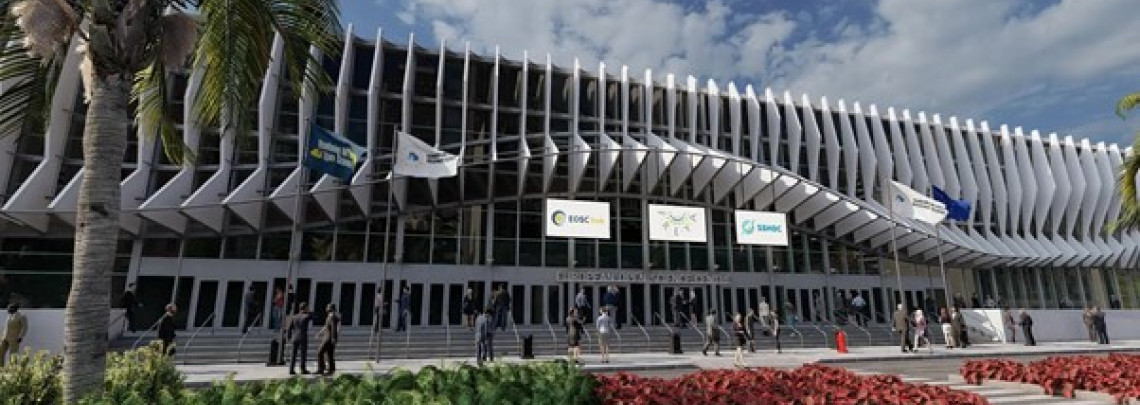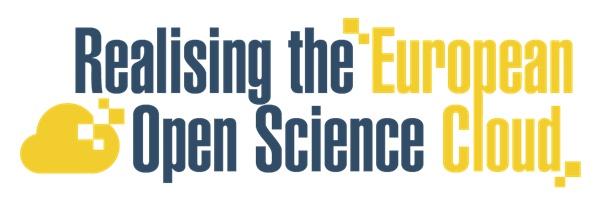This is a website for an H2020 project which concluded in 2019 and established the core elements of EOSC. The project's results now live further in www.eosc-portal.eu and www.egi.eu
This is a website for an H2020 project which concluded in 2019 and established the core elements of EOSC. The project's results now live further in www.eosc-portal.eu and www.egi.eu


Bringing forward the last large-scale event of the season for the European Open Science Cloud community, EOSC-hub, SSHOC, and FREYA banded together to organise the Realising the European Open Science Cloud and EOSC Projects EXPO from 16-19 November 2020 at the virtual “European Open Science Centre” venue specially built to host the event.
The theme of the event was “Towards a FAIR research data landscape for the social sciences, humanities and beyond”. Up to 700 participants from 45 countries (20 of which were outside the EU) participated at the event. The conference programme included 30 sessions featured in the virtual auditorium. A virtual exhibition hall also hosted the EOSC Projects EXPO that showcased 33 booths that accumulated almost 4,000 visits, 900 video views and 1500 document views.
The opening plenary and keynote featured European Commission Communications Networks, Content and Technology Directorate-General - eInfrastructure and European Open Science Cloud Deputy Head of Unit Liina Munari who gave a high level overview of where the EOSC initiative is. She described EOSC in Horizon Europe, the launch of the EOSC Association and the wrapping up of the work of the EOSC Executive Board and its Working Groups and Task Forces.
Liina also gave an overview of some of the last EOSC-relevant Horizon 2020 projects to start such as EGI-ACE, DICE, OpenAIRE Nexus, C-SCALE, and RELIANCE, that will increase the service offering of the EOSC Portal, and EOSC FUTURE, which will integrate and consolidate existing pan-European access mechanism to public research infrastructures and commercial services.
Data Archiving and Networked Services (DANS) Deputy Director Ingrid Dillo then spoke about community initiatives that became critical pieces of international data infrastructure. She provided the example of RDA and its COVID-19 Working Group that developed guidelines and recommendations on how the COVID-19 research data can be better shared.
Lobby
The first day was dedicated to the theme of policy and governance. The first session was Thematic Discovery Marketplaces for EOSC which called for ensuring low barriers for entry for marketplaces, putting the convenience for users and providers as a priority, incentives to encourage participation, emphasizing the added value of marketplaces to users and harmonising the harmonisation that is already existing within various thematic communities.
Persistent identifiers (PIDs) we’re also highlighted in sessions such as The place of PIDs in the EOSC and FREYA PID Graph Services. Due to its importance in facilitating FAIR data, PIDs will be an important area of development in EOSC. However, missing PIDs have been noted particularly for instruments and services.
Sessions such as SSHOC Innovations in Data Production and The Ethnic and Migrant Minorities' Survey Registry both provided some SSHOC innovations and services. Meanwhile, the session EOSC Core and the Service Management System (SMS) the state of the SMS was presented and was well received by the audience.
In FAIR Data-Citation for Social Sciences and Humanities (SSH), it was emphasised that data citation has moved from obscurity to the spotlight and at the very core of research. FAIR data citation should be the default mode of publication to ensure reproducibility and reusability of the data. One of the main challenges for FAIR data citation within the SSH is the diversity of the disciplines and the lack of incentives for researchers.
Conference Auditorium
Day 2 of the conference programme concentrated on the technology and infrastructure theme. The session How can I onboard my resource to EOSC showcased the latest major release of the EOSC Portal which saw the final merger of registries from EOSC-hub and EOSC Enhance, the implementation of new provider and resource profiles, launch of the Providers Dashboard, and an upgraded Marketplace.
This session was followed by EOSC Interoperability: Architecture and FAIR Data Aspects where it was highlighted that to ensure FAIR and interoperable data in the future and in the long run, urgent actions needed to be implemented now. A lot of technical and content work has been already done on implementing FAIR principles when preparing a dataset, becoming a trustworthy repository, gaining approval by the CoreTrustSeal commission, and various EOSC services, but there’s still work to be done in ensuring communities, services and resources are more connected. This session then broke into three breakout sessions.
In FAIR Data Implementation, the challenge of ensuring trust from users and data depositors was discussed with certification being the key. CoreTrustSeal was presented as a solution which supports researchers when thinking about their data in the future. Achieving CoreTrustSeal demonstrates Trustworthy Data Repository status and emerging EOSC work is aligning repository maturity with the ability to enable FAIRness.
In Architecture and Interoperability Guidelines: EOSC-hub presented the technical specifications and interoperability guidelines for the EOSC-hub Internal services in the EOSC-hub portfolio.
In Metadata Interoperability: SSHOC and Beyond, the session was built around “standards meeting reality”, specifically covering solutions to current challenges and improvements proposed while noting heterogeneity in data and solutions across service providers and archives.
The session Developing the PID Graph introduced the concept of the PID Graph (i.e. connecting different PID systems). Examples were given on how the PID Graph can be used to discover connections.
The session Thematic Discovery Portals in the EOSC saw the TRIPLE Platform and SSH Open Marketplace. Both platforms were seen as complementary and not competitive. A key outcome of the session was the decision to create a task force to identify synergies and avoid duplication of efforts. In Thematic services for social sciences and humanities & SSHOC WP3 lifting technologies into the SSH Cloud, a number of highly interoperable services such as the UDPipe and CLARIN Language Resource Switchboard were presented where, from a researcher’s perspective, the maturity of the presented services is high not only for natural language processing but also for broader Social Sciences and Digital Humanities research.
Towards the end of the day, two tools were presented. The PID Forum was showcased, highlighting its role as a platform for scholars interested in PIDs and FAIR data. It can currently be accessed through www.pidforum.org. SSHOC presented Dataverse, an open source repository software for sharing and publishing datasets.
The day dedicated to training and community building began with a session on best practices from EOSC-hub, FREYA and SSHOC where it was highlighted that there is a need for more coordination between the various communities to ensure collaboration and integration of approaches, rather than a dispersed approach and repetition. Nonetheless, the different projects managed to reach a wide global audience with their community programs.
The session dedicated to Citizen Science showed how research libraries have an essential role to play in the development of citizen science through the BESPOC model and other means, acting as knowledge broker and facilitator. At the panel session, possible collaborations were uncovered and a follow-up discussion could include the relation and interaction between EOSC and Citizen Science.
Tackling the FREYA PID Commons and the PID Federation, while the session highlighted the need to align and foster coordination and interoperability, there was no strict conclusion on how this can be realised. The report on the PID federation provides a first step to assess the community needs which will be taken further after the end of the FREYA project.
A session was also dedicated to Engaging the Private Sector. A clear message that came out is not to reinvent the wheel and make use of the private sector engagement mechanisms that are already out there. One example is the EOSC Digital Innovation Hub. This session brought actors from the EOSC, Digital Innovation Hubs and the Big Data Value Association together in one discussion, where they stressed yet again the importance of the European Strategy for Data for both academia and industry. A session also presented results from the EOSC Early Adopter Programme Pilots from EOSC-hub with presentations on experiences with EMSO ERIC, Copernicus, Open AiiDA in materials science, ECRIN, and INRA in plant phenotyping. Different thematic services and competence centres have presented how their services have been improved or implemented during EOSC-hub in the session EOSC-Hub Competence Centres and Thematic Services. The presentations showed also how the services can be part of the EOSC service portfolio and benefit communities.
The day ended with an overview of the PID training materials available in FREYA and within other projects in the session FREYA Knowledge Hub and Training. There was also a spotlight on the ARIADNE Portal and SSHOC Surveycodings.
On its final day, the conference programme tackled the issue of sustainability and the way forward. In the session Challenges in Sustainability of FAIR Research Data and Services for SSH and Beyond, one of the takeaways is that projects have to be able to identify the costs of the services for them to be maintained beyond the project’s life. Organisations that are stable beyond the project such as ERICs are the best suited to take this forward because they have experience and responsibility to do this. It was also highlighted that a lot of national data providers, with a keen interest in supporting open science, experience a clash between open science policy and the availability of funding to implement it. At times, there's only funding to use them locally. To make thematic services sustainable, we need a shift in how national funding is distributed. Other key points that came out of the session is the need to continue funding schemes for communities and clusters and that EOSC needs to put the researcher at the centre to ensure uptake.
The final session EOSC in Practice From Research Communities’ Perspective saw the continued struggle of making full use of digitisation. Across disciplines, fragmentation on data remains and how to handle sensitive data is still an open question. The session also looked at what the EOSC could be like in 10 years with several panellists calling for the exploitation of artificial intelligence and machine learning solutions.
Organised as part of the Realising the European Open Science Cloud joint event by the EOSC-hub, FREYA and SSHOC projects, the EOSC Projects EXPO was the first virtual exhibition showcasing initiatives and projects of the European Open Science Cloud. More than 30 exhibitors were present, each with their own fully customised booth filled with various resources such as documents and videos. The EOSC Projects EXPO was opened by SSHOC Coordinator Ron Dekker at the end of the opening plenary which showcased some of the latest developments towards “realising a European Open Science Cloud” from the many initiatives and projects that are working together towards the same goal.
At the end of the event, the best exhibition booths were selected. The winner of the Best Booth Award of the EOSC Projects EXPO was NEANIAS. 1st Runner up went to the EOSC Digital Innovation Hub. 2nd Runner Up was awarded to ENVRI-FAIR and FAIR for Health Research.
Best Booth Award Winner - NEANIAS Booth
|
All conference materials, slides and recordings can be accessed via the agenda pages: eosc-hub.eu/events/realising-european-open-science-cloud/agenda Materials displayed at various booths of the EOSC Projects EXPO have also been retained and are accessible through: eosc-hub.eu/events/realising-european-open-science-cloud/exhibitors |